Grassley, Ernst urge FDA to revise hand sanitizer guidance



June 4, 2020
BY Erin Krueger
Sens. Chuck Grassley, R-Iowa, and Joni Ernst, R-Iowa, issued statements on June 3 announcing they will continue to push the Food and Drug Administration to provide needed flexibility for ethanol producers working to help the U.S. overcome shortages of hand sanitizer during the COVID-19 pandemic.
The FDA on June 1 updated guidance to provide additional clarification no the manufacturing and compounding of certain alcohol-based hand sanitizer products to help ensure that harmful levels of impurities are not present in ethanol used in hand sanitizer.
Advertisement
Advertisement
The Renewable Fuels Association said the updated guidance does provide clarify to ethanol producers, but stressed it won’t help resolve the current shortages of hand sanitizer products.
FDA’s updated guidance came roughly a week after Ernst and Grassley sent a letter to FDA Commissioner Stephen Hahn on May 26 urging the agency to clarify its temporary policy for the manufacture of alcohol-based hand sanitizer products during the COVID-19 pandemic. In that letter, the two senators requested the FDA provide clarification on its temporary policy and the agency’s scientific justification relating to the recommended levels of acetaldehyde used in hand sanitizer products.
“During this trying time, we need all hands on deck,” Grassley said in a June 3 statement. “Many communities in Iowa and around the country are answering the call by shifting their ethanol production to create alcohol-based hand sanitizers. While I appreciate hearing from the FDA, setting such a high standard for acetaldehyde is concerning. Acetaldehyde occurs naturally in the distillation process and at this current standard many common alcoholic beverages would be deemed out of compliance. I plan to continue to work with FDA to set a reasonable standard that protects public health and gives Iowa ethanol producers the flexibility to aid Iowa hospitals and communities.”
Advertisement
Advertisement
“Iowans continue to step up and help one another out during COVID-19, and that certainly includes our ethanol producers and distillers who have used their resources to help create hand sanitizer,” Ernst added. “I’m glad that FDA heard our concerns and those of industry and provided much needed clarity, but I’m concerned this guidance may be too restrictive, leaving ethyl alcohol produced by Iowa’s ethanol industry on the sidelines when the need for hand sanitizer remains high. I’ll continue to push FDA to provide additional flexibility so our producers can aid in the fight to defeat COVID-19.”
Grassley and Ernst previously highlighted that Health Canada—the Canadian government’s equivalent to FDA—published a temporary standard that slightly relaxes limitations on acetaldehyde so that ethanol producers may help meet the growing need for hand sanitizer. Canada’s temporary acetaldehyde level is 20 times higher than the current FDA recommendation.
Related Stories
The U.S. Energy Information Administration maintained its forecast for 2025 and 2026 biodiesel, renewable diesel and sustainable aviation fuel (SAF) production in its latest Short-Term Energy Outlook, released July 8.
XCF Global Inc. on July 10 shared its strategic plan to invest close to $1 billion in developing a network of SAF production facilities, expanding its U.S. footprint, and advancing its international growth strategy.
U.S. fuel ethanol capacity fell slightly in April, while biodiesel and renewable diesel capacity held steady, according to data released by the U.S. EIA on June 30. Feedstock consumption was down when compared to the previous month.
XCF Global Inc. on July 8 provided a production update on its flagship New Rise Reno facility, underscoring that the plant has successfully produced SAF, renewable diesel, and renewable naphtha during its initial ramp-up.
The U.S. EPA on July 8 hosted virtual public hearing to gather input on the agency’s recently released proposed rule to set 2026 and 2027 RFS RVOs. Members of the biofuel industry were among those to offer testimony during the event.
Upcoming Events










